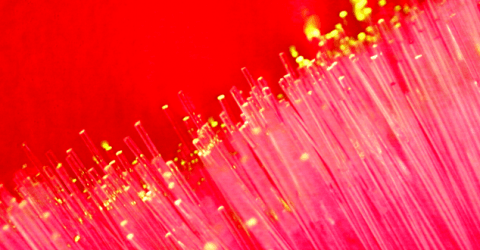What is Dark Fibre and how will it cut broadband bills?

You’ve probably never heard of it, but Dark Fibre could change the future of UK broadband forever.
Behind the curtain, Ofcom and BT are duking it out over an issue that looks to reshape the backbone of the industry.
Shedding light on Dark Fibre
Almost all fibre (38Mbps and up) and ADSL (up to 17Mbps) broadband in the UK uses Openreach. ISPs like TalkTalk and Sky don’t actually own or operate the technology or cables that deliver broadband to their customers – it all comes through the Openreach network.
The cables these ISPs use are known as ‘leased lines’ because the ISPs buy a ‘lease’ for some space on the Openreach network to sell on to their own customers.
This means that Openreach is solely responsible for building, maintaining and, most importantly, upgrading a network used by dozens of different ISPs.
Dark Fibre lines function differently from leased lines. Instead of buying bandwidth wholesale, an ISP instead buys some physical space inside the pipes of the Openreach network.
This space can be used by the ISP to lay their own fibre cables or connect existing cables to their own exchanges and routers.
Giving ISPs – not Openreach – more power
With their own fibre cables in the ground, ISPs can have their own infrastructure without having to build it all from scratch.
The most expensive part of building a new network is digging up the ground and laying down the piping. With this cost removed, ISPs can more readily install their own infrastructure and then maintain and upgrade it themselves.
Waiting for Openreach to lay down fibre optic cables has been a very frustrating experience for both customers and ISPs, as it can take several years for planned upgrades to finally become a reality.
NewsBT forced to split from Openreach after regulator steps in
It certainly seems that upgrading the broadband of the entire country in a timely manner is simply too big a task for one company to fulfil.
Ofcom unveiled its plans for Dark Fibre in April, which would oblige BT Openreach to make the service available for purchase everywhere in the UK, excluding Central London and Hull – where it wasn’t deemed necessary.
When announcing the proposals, Ofcom’s competition policy director, Yih-Choung Teh, said the new measures would “put other providers on a level playing field with BT, so they have the confidence to invest in their own full-fibre networks.”
However, after some pushing from BT, Ofcom’s plans were recently cut down by the Competition Appeals Tribunal (CAT), who concluded that several definitions and assumptions made in Ofcom’s review of wholesale broadband were inaccurate or incorrect.
Heavy handed?Ofcom launch special division just to keep Openreach honest
The intricacies of the issue are based around a lot of technical jargon but – to boil it down to the basics – the matter comes to who benefits most: ISPs or wholesale providers.
Why is Dark Fibre good for the consumer?
Dark Fibre is good for ISPs because they can upgrade and customise their service as much as they want, for far less cost.
It’s expected these savings will be passed on to the consumer, dropping the cost of broadband bills for all.
On the other hand, Dark Fibre demands that Openreach continues to bear a lot of the responsibility for broadband infrastructure, with less compensation. Although Openreach would no longer be in control of the entire network, they would still need to maintain and build the pipes and telephone poles that ISPs can put their own wires through.
Dark Fibre makes widespread 5G more likely
It is unclear if Ofcom will redraft their rules for Dark Fibre or have to start over from scratch.
If it is brought in, Dark Fibre should mean that full-fibre broadband reaches out to customers much faster than it otherwise would. Opening up the pipes will give ISPs a relatively cheap and fast way to offer premium broadband to their customers.
This is especially relevant with the imminent arrival of 5G mobile broadband. Dark Fibre could dramatically speed up the rollout of this revolutionary new standard, helping to bring the UK to the forefront of 5G.
So Dark Fibre should make for faster, cheaper broadband – but this could only be in the short-term.
Even though Dark Fibre does remove some control from Openreach, it still results in an infrastructure that is entirely dependent on Openreach effectively maintaining and building pipes and telephone poles nationwide.
The real task here is to encourage more wholesale providers to start constructing their own infrastructure, naturally reducing the monopoly of Openreach and resulting in a healthy, diverse range of broadband networks and services.
Increasing the availability of Dark Fibre may lead to some short-term gains, but there’s still a lot of renovating left to be done before cheap, fast broadband is available nationwide.
MAIN IMAGE: Roshan Nikam/Flickr






